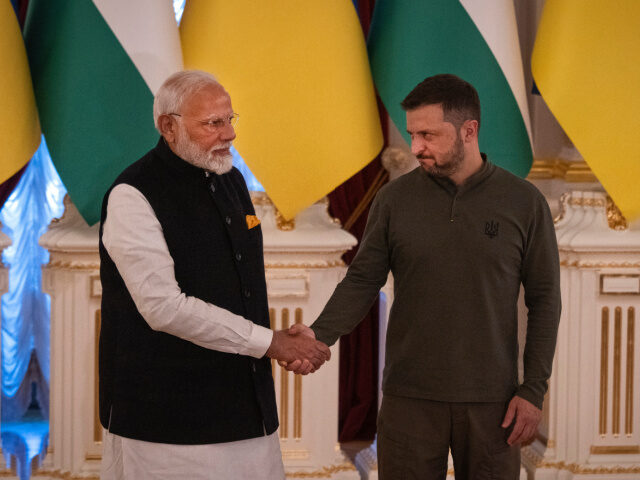Indian Prime Minister Narendra Modi made a historic visit to Kyiv, Ukraine, alongside President Volodymyr Zelensky on Friday, signing multiple agreements with the state and honoring the victims of Russia’s invasion.
Modi became the first person in India’s top government office to visit sovereign Ukraine and sought to improve ties after months of tensions between Kyiv and New Delhi, originating in India’s close relationship with Russia. India is one of Russia’s most loyal buyers of crude oil, buying it cheaply and refining it to sell it at higher prices to the West. The Indian government has also refused to sign onto sanctions on the Russian economy and Modi himself has visibly elevated his friendship with Russian strongman Vladimir Putin in the public eye, visiting Moscow in July.
Zelensky was publicly critical of Modi for meeting with Putin, to which Modi responded by agreeing to visit Kyiv.
Modi began his tour of Kyiv by meeting with Indian nationals in the capital city, then met with Zelensky to mark the eve of Ukrainian Independence Day and honor civilian victims of the Russian full-scale invasion:
Reached Kyiv earlier this morning. The Indian community accorded a very warm welcome. pic.twitter.com/oYEV71BTlv
— Narendra Modi (@narendramodi) August 23, 2024
“Conflict is particularly devastating for young children. My heart goes out to the families of children who lost their lives, and I pray that they find the strength to endure their grief,” Modi said in a statement for social media.
President @ZelenskyyUa and I paid homage at the Martyrologist Exposition in Kyiv.
Conflict is particularly devastating for young children. My heart goes out to the families of children who lost their lives, and I pray that they find the strength to endure their grief. pic.twitter.com/VQH1tun5ok
— Narendra Modi (@narendramodi) August 23, 2024
Zelensky, in turn, shared images of his time with Modi and celebrated the historic nature of the visit.
“Today, we reached an agreement on four documents between Ukraine and India, covering the medical field, agricultural cooperation, humanitarian relations, and culture,” Zelensky explained. “Following the visit, we also agreed on a joint statement focusing on the development of a strategic partnership, bilateral trade, and continued military-technical cooperation.”
“India supports Ukraine’s national sovereignty and territorial integrity. And this is critical because everyone in the world must equally respect the UN Charter,” he concluded:
Today, history was made. The Prime Minister of India @narendramodi made his first visit to Ukraine since our country's independence, on the eve of our Independence Day.
Today, we reached an agreement on four documents between Ukraine and India, covering the medical field,… pic.twitter.com/I65cVWkbw7
— Volodymyr Zelenskyy / Володимир Зеленський (@ZelenskyyUa) August 23, 2024
Modi appeared to sidestep any direct condemnation of Russia, a critical provider of military gear, crude oil, and other core imports to India. In a joint statement with Zelensky, published by the office of the Ukrainian presidency, India “reiterated its principled position and focus on peaceful resolution through dialogue and diplomacy” in broad terms.
The focus on the joint statement elsewhere was economic, with heavy emphasis on increasing trade in agriculture and drugs.
“The Leaders appreciated various efforts to ensure global food security, including Ukrainian humanitarian grain initiative,” the statement read. “The importance of uninterrupted and unhindered supply of agricultural products to global markets, especially in Asia and Africa, was emphasized.”
Zelensky and Modi agreed to work on the “enhancement of cooperation in areas such as trade and commerce, agriculture, pharmaceuticals, defence, education, science & technology, and culture,” as well as “digital public infrastructure, industry, manufacturing, green energy etc.”
Zelensky described the top categories of joint efforts as “the healthcare field, cooperation in the agricultural area, humanitarian relations, and culture,” according to the state media outlet Ukrinform.
“I’d really like to personally thank the Prime Minister of India for the fact that he kicked off his visit by commemorating our fallen children, who were taken by the Russian army, whom they killed with their aggression,” Zelensky added.
Modi’s messaging in Kyiv was very similar to the goals of his visit to Moscow. In July, Modi said that he discussed with Putin “ways to diversify India-Russia cooperation in sectors such as trade, commerce, security, agriculture, technology and innovation.” On the invasion of Ukraine, Modi said at the time, “I believe there is no peace on the battlefield and solutions to the war can only be found through dialogue.”
Modi’s coziness with Putin – the Russian leader awarded Modi the Order of St. Andrew, the nation’s highest honor for foreigners – outraged Zelensky at the time.
“It is a huge disappointment and a devastating blow to peace efforts to see the leader of the world’s largest democracy hug the world’s most bloody criminal in Moscow on such a day,” Zelensky wrote in a social media message. The statement was notable, as Ukraine had largely abstained from criticizing India despite its close economic and political ties to China. The Indian government summoned the Ukrainian ambassador in the country in response to Zelensky’s message, which apparently led to Modi’s travel to Ukraine this week.
Modi does not appear to be redirecting India’s foreign policy away from Russia, however. On Thursday, Reuters reported that India overtook China as the world’s largest buyer of Russian crude oil in July, importing 2.07 million barrels per day (bpd) in July, a record for the country.
India imports Russian crude both to meet domestic demand and to refine it to sell abroad. The declining price of Russian crude, a result of Western sanctions on Russia’s fossil fuel industry, have made it extremely profitable for India to refine it at home and sell it abroad, often to countries that imposed sanctions on Russian oil.

COMMENTS
Please let us know if you're having issues with commenting.